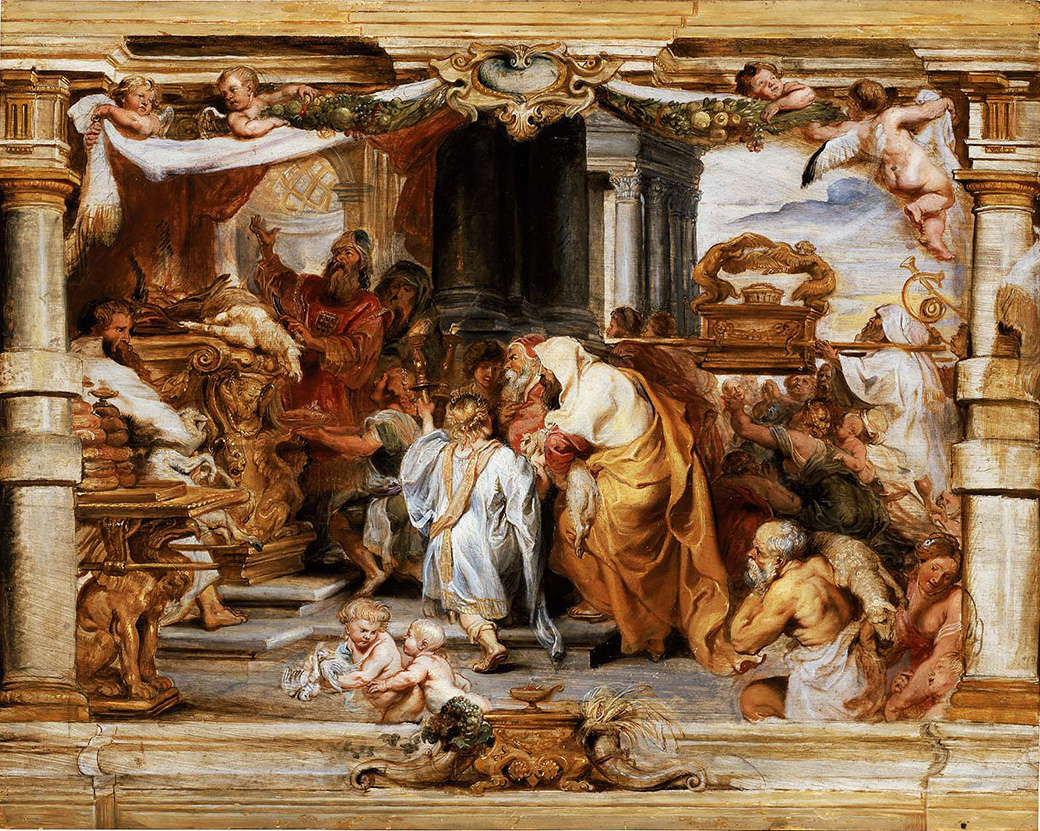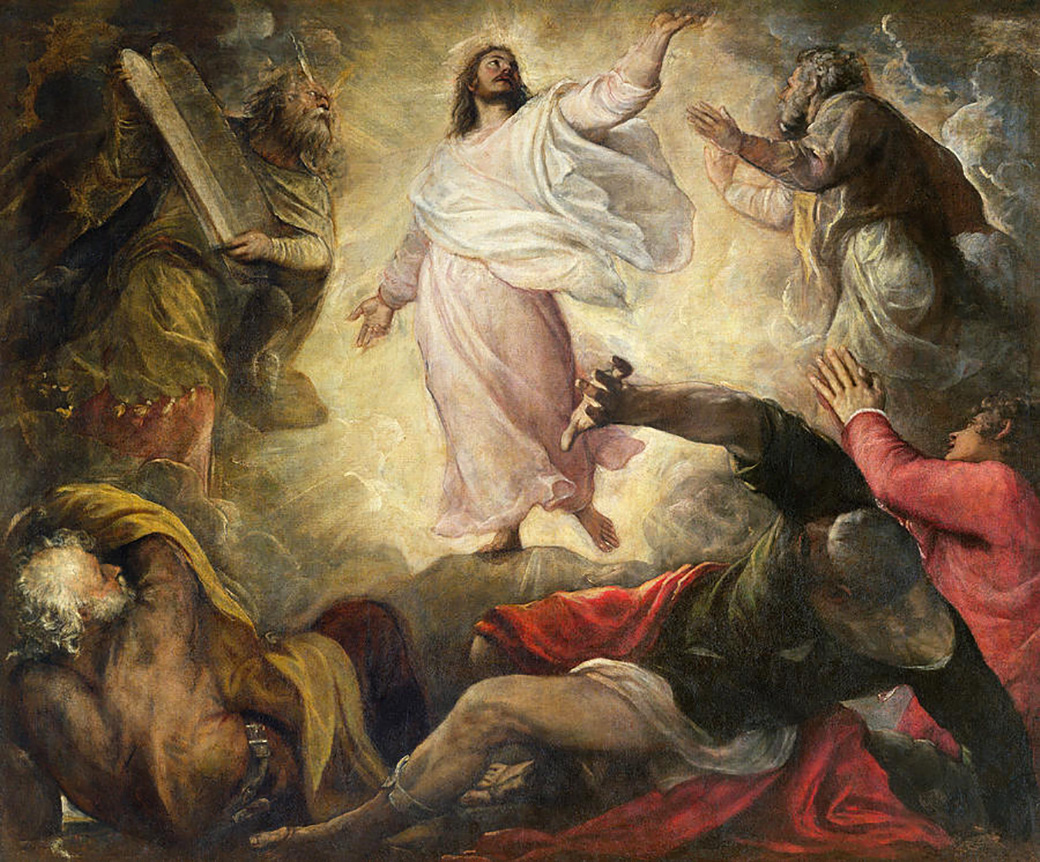Saturday in the First Week of Lent: Deuteronomy 26:16-19, Matthew 5:43-48.
A covenant is an agreement, a pact, a legal contract. When covenants are offered by God, they take on more significance, guaranteeing protection and favor for the people and adoration and obedience to God. Covenants with God are so important in the Jewish tradition that they trump earthly agreements between kings and peoples. As Christians, we inherit this same understanding of God’s covenant being the orienting principle to our entire lives, above all other agreements or laws.
Today’s readings trace the establishment of the Mosaic Covenant as well as the New Covenant, drawing similarities and points of departure between them. Our God does not change, nor do his promises to us, but what he asks of us evolves in relation to the readiness and receptiveness of humanity to understand and perform his will. Aphraates, the Bishop of the monastery at Mar Mattai (near modern-day Mosul), speaks to this succession of covenants. He is also known as the “Persian Sage” and is considered one of the very important Syriac Church Fathers. His words are part of the Liturgy of the Hours, recited during the Office of the Readings on Wendesday in the First Week of Lent:
Law and covenant have been entirely changed. God changed the first pact with Adam, and gave a new one to Noah. He gave another to Abraham, and changed this to give a new one to Moses. When the covenant with Moses was no longer observed, he gave another pact in this last age, a pact never again to be changed. … Every covenant was proved firm and trustworthy in its own time, and those who have been circumcised in heart are brought to life and receive a second circumcision beside the true Jordan, the waters of baptism that bring forgiveness of sins. (from the 11th Demonstration (homily) on Circumcision, 344 AD.)
This is helpful for us to understand how God slowly prepared humanity for the gift of his Son, giving us progressively more nuanced and deep commandments to follow. He prepared our hearts, generation after generation, to receive the Truth in the flesh. As one of my heroes, Jean Corbon, OP, says in his book Wellspring of Worship, “Through faith men begin to become responsive and accepting and to enter into covenants. The seed of the Resurrection is sown in the time of death … This is the time of God’s venture in history and his preparation of man for the full truth; it is the time of reciprocal searching and of the fidelity of the Holy One that is maintained despite the infidelities of his sinful people” (34-35). Covenants seem to serve as a kind of spiritual weight training, a way to grow the “muscle” of faith.

We hear a very clear contract in the earlier covenants, such as the Mosaic one in today’s first reading, when he says “provided you keep all his commandments, he will then raise you high in praise and renown and glory above all other nations he has made.” At this time, the Jews were very concerned with building a nation, having a land for themselves, and being protected from their enemies. God found a way to work within these secular concerns and plant the seed of faith and obedience to something not of this world. The promise in return for faithfulness is something to which they can relate: renown and glory above the other nations.
Jesus comes 1300 years after Moses, after the time of human infidelities and renewed covenants, not to mention prophets who spoke the Word of God with astoundingly clear proclamations of Christ’s coming mission and impact. These events shaped the tenor and direction of the Jewish faith until it was ripe for the Christ event — from the Annunciation (Mary’s readiness to accept the gift) to the Resurrection and Pentecost (the apostles’ readiness to accept the Spirit and mantle of evangelization).
Interestingly, the terms of the covenant were quite clear and easy to accept when the Truth was still partially hidden from view (the time of the Old Testament), yet our ability to grasp the terms and import of the New Covenant have an almost inverse relationship to the nearness and clarity of the truth. In other words, because the unity of God and man is so profound and real with Christ, the Word describing our new covenant is almost beyond our comprehension, somehow obscured in its mystery and proximity, as if peering at it through a cloud of incense at Mass. As an example of what I mean, we see time and again that the disciples don’t quite understand what Jesus’s parables and teaching are all about. Some of his teaching is too difficult for them to accept, like the revelation of his very flesh and blood being the food of life and that we must eat it, and they leave in droves. Even today, it’s easier for Catholics to believe in a simplified “love one another” existence than the nuanced call to dwell in God first and love others because you are loving Him in them. Or easier for Christians of other denominations to disregard the call to literally eat his flesh and drink his blood to be sacramentally purified and joined with the triune God. The closer the mystery and the truth, the more of a deep faith is required. After all, it’s much easier to have faith in a God who helps you win a battle than it is to have faith in a silent Trinity pouring out their ever-flowing love on humanity, specifically through sacraments that were established when one Person of the Trinity died in an act of love for his Father and then bodily rose from the dead. This is the difficult work of faith we are called to bring to our New Covenant.

Today’s reading from St. Matthew shows Jesus tackling these difficulties head-on: “You have heard that it was said, You shall love your neighbor and hate your enemy. But I say to you, love your enemies, and pray for those who persecute you.” Jesus refers to some liberties taken by the scribes and Rabbis who took commandments from old covenants and applied them not to personal interactions (instead of the establishment of nationhood). Jesus is straightforward in reversing this errant teaching.
Why on earth would we pray for those who persecute us? The answer, in fact, lies in heaven, not earth. Jesus explains that we do this “that you may be children of your heavenly Father, for he makes his sun rise on the bad and the good.” To be a child of the heavenly Father in this New Covenant is something much more profound than the nation-building hopes of the chosen people in the old covenants. The real union with God that Christ gives us means that we really have a filial relationship with God. If we inherit our being from God (which we always have since he is our Creator), then we have inherited a fundamental holiness that is contained in the soul of each of us. Christ renews and perfects the holiness in us through the sacraments. This holiness demands: a.) that we do not hate others out of our moral integrity with our God-infused souls, and b.) that we must respect the holiness found in every other human. We simply cannot hate them (which includes the inseparable part of them that is God) while at the same time being true to our covenant with God. As we explored in Thursday’s post , we can’t expect to dwell in God and push Him away at the same time. Thus, we must pray for those who persecute us beause they are not being true to their Godly nature, and we see God in them and love and respect them for it.
Jesus is clear that our aim is not to be like pagans and sinners who only love those who are easy to love, those on their own side. Instead, we must “be perfect, just as your heavenly Father is perfect.” Let that sink in for a moment. It’s no small potatoes, this covenant we have. It’s a lot easier to focus on the benefits we get from our God, like everlasting life in the Kingdom, than it is to think about our own requirements as part of this contract. But Lent is a time to seriously consider just what we’re doing here.
It’s a whole-body, whole-mind, whole-soul venture to be a Christian. How do you arrange your days between work, children, colleagues, leisure, and God? Where is God in the list of priorities? How often each day are you praying to Him and talking to Him? Are you carrying love of Him into every interaction with another human being that you have in a week?
In short, are you living up to your end of the covenant?
Pingback: Transfiguration Reveals Truth According to His Own Design
Pingback: The importance of The Examined Self Before God
Pingback: A Prophet in his Own Land is never accepted
Pingback: Our Vocation to Teach the Word of God